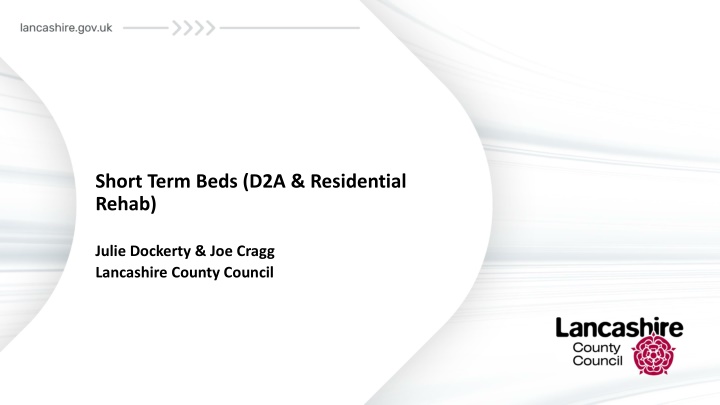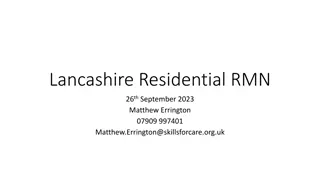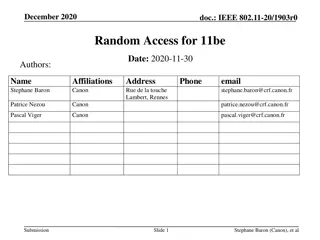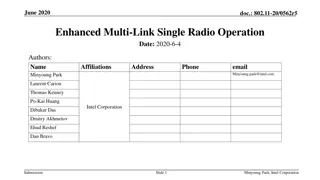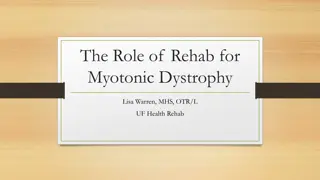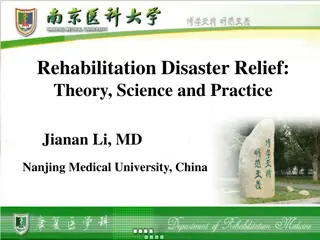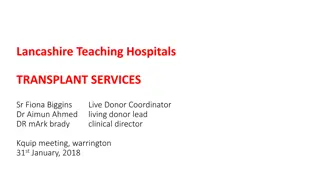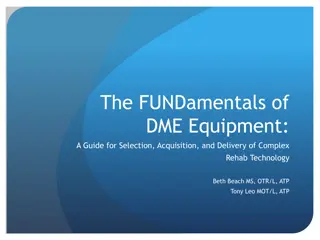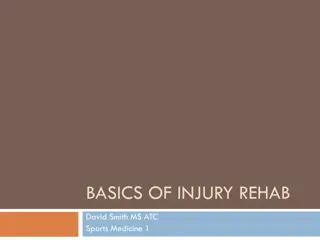Proposal for Enhanced D2A/Residential Rehab Service in Lancashire
Lancashire County Council aims to enhance its D2A pathway by developing a hybrid residential D2A/Rehab model to maximize bed capacity, improve therapy services, and promote independence. The proposal includes transitioning current Rehab beds to offer an improved service in three stages, aligning with national guidelines for Intermediate care and seeking market input to pilot the approach for Winter 2023.
Download Presentation

Please find below an Image/Link to download the presentation.
The content on the website is provided AS IS for your information and personal use only. It may not be sold, licensed, or shared on other websites without obtaining consent from the author.If you encounter any issues during the download, it is possible that the publisher has removed the file from their server.
You are allowed to download the files provided on this website for personal or commercial use, subject to the condition that they are used lawfully. All files are the property of their respective owners.
The content on the website is provided AS IS for your information and personal use only. It may not be sold, licensed, or shared on other websites without obtaining consent from the author.
E N D
Presentation Transcript
Short Term Beds (D2A & Residential Rehab) Julie Dockerty & Joe Cragg Lancashire County Council
Background What is D2A (Discharge to Assess) bed based? D2A pathway is a funding mechanism that enables people to be discharged from an acute hospital into the community, normally to a care home or a specific D2A facility Enables a period of recovery and ongoing intervention for those who are unable to immediately return home on discharge from hospital The duration of stay can broadly range from 1-4 weeks, but sometimes longer to enable time for ongoing assessments to support the next steps of a persons journey Discharge to Assess placements (D2A beds) are currently purchased on a spot basis Across Lancashire the D2A bed offer does not deliver a robust therapy offer, therefore impacting outcomes on Uncertainty on capacity, response times and cost LCC Residential Rehab offer: An In-house Rehab bed based provision with facilities across Lancashire In reach Allied Health service supporting a delivery of a therapy based offer Duration broadly range 1-6 weeks
Where are we now? A recent review of the in house offer led to an options paper concluding a proposal to further develop the inhouse model to provide a hybrid residential D2A/Rehab model Key aims are to: Maximise the unoccupied bed based capacity within the inhouse home Condense the number of bed based facilities to which people can access to deliver a more efficient service Benefits in working together to meet the anticipated need ability to use vacant capacity for those who successfully express an interest Work with the system on an expanded therapy offer enable better use of resource Maximise a persons independence through a reabling/therapy approach
Proposal Short Term Beds Service It is proposed that we utilise our current LCC In-house Rehabbed based provision to offer an improved D2A/residential rehab service This will require significant change in the way in which the current rehab beds operate but will maximise use of the establishments and the links already made with therapy and GP s. Due to the significant change required it is proposed that the transition to a new model is done in three stages: Immediate Using national guidance for Intermediate care to strengthen our bed based offer Work to be undertaken to prepare 8 LCC establishments to be ready to undertake D2A with a rehab approach in readiness for Winter 2023. Seek expressions of interest from the market to work to an agreed specification to supplement anticipated requirements and pilot the approach for Winter 2023 - Approx15 places needed Further work needed with ICB to support therapeutic in reach in all short term bed services where this isn t currently in situ Further work needed with ICB in relation to short term Nursing bed provision Medium Term build upon the work already undertaken to ensure that we have right provision in the right location. Further work will be undertaken to upskill care workers and build further links with health (social prescribers) to improve the offer to our citizens Long Term there is wider work being undertaken to review to ensure that the plans align with our vision for Short Stay beds and that we have the right quantity of beds in the right location, giving consideration to the current adopted model and what has and hasn t worked well up to this point.
Current Activity/ Timelines Currently LCC have 87 Short Term beds now live within Older People s Care Service. District Available Bed Capacity Maximum Dependency Capacity (A02) Dementia Capacity North 23 8 10 Central 30 12 12 East 10 8 0 Fylde & Wyre 15 4 0 West Lancashire 9 4 0 We plan to formally launch the Short-Term Bed based model on 1stOctober 2023 Short Term Beds will all be sourced through LCC's Older Peoples Care Services and they will be the first point of contact for these referrals. The plan is for Older Peoples Care Services to be delivering up to 100 of these beds, gradually increasing their capacity for service users who require high dependency support. However, during times of high demand such as winter we anticipate the need to spot purchase externally with the independent sector.
Next Steps & Timescales Providers to submit an expression of interest by November 2023 We will be seeking confirmation from providers they are able to meet the requirements of the short term bed service specification and the rate will be given of the fixed rate for all Short Term Bed placements. ? Name for the service Discharge Support Facilitation Discharge Beds Others
Intermediate Care Approach Rehabilitation Reablement Recuperation Definition Intensive rehabilitation support, bed based or home based which is led by OT or Physio Relearning skills and abilities which were achievable prior to change in circumstances. Short term goals based around function. Period of care support as part of recovery from illness or exertion which is anticipated to be short term. For example, post operation recovery, delirium
Our Five Principles for Successful Recuperation, Rehabilitation and Reablement Services Principal 1 We will always think Home First" We will always work to optimise a person s potential for recovery, rehabilitation and reablement before we undertake an assessment for their long term care needs Principle 2 There will be no wrong door to accessing the right care, at the right time in the right place Principle 3 Principle 4 We will measure what matters Principle 5 We will enable and support all colleagues to develop and work collaboratively
Outcomes Support people to regain life skills that have been temporarily lost, or where there has been a gradual deterioration or a risk of loss of ability, and to help people to retain or regain their independence Prevent people from requiring more intensive forms of care (for example, hospital or care home) and to help them return home after a stay in hospital or in a short-term care home setting. Help people avoid unnecessary admissions into residential homes, hospital or other formal care settings through working with the individual and their support networks Support people to return home with high quality interventions and be connected within their local communities where they feel safe and supported with personalised care that promotes choice and control in all aspects of daily life. Support people to achieve their goals through a strengths-based approach which allows people to learn new ways of undertaking personal and home-based activities, with the support of equipment and/or technology to help them remain independent.
